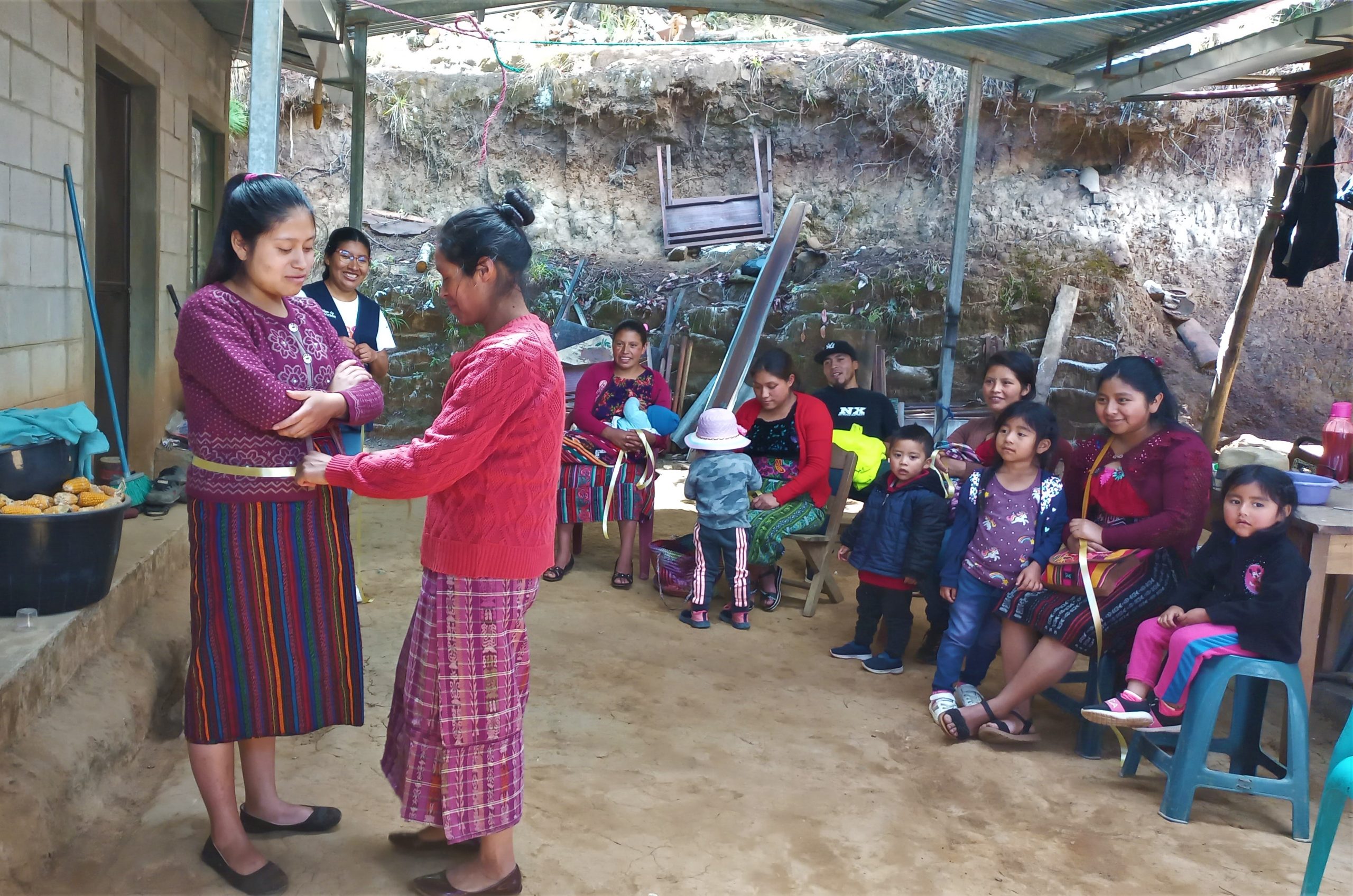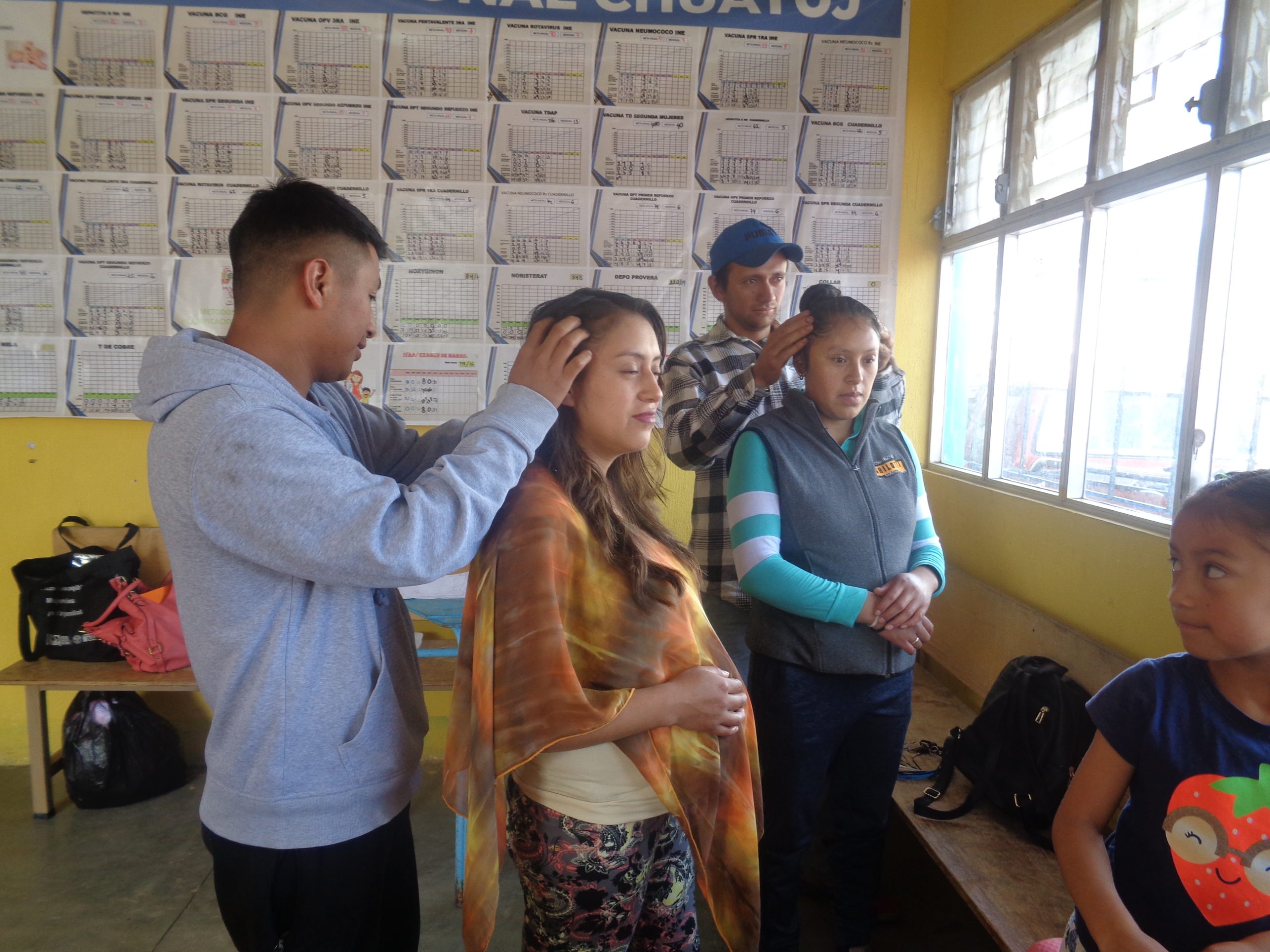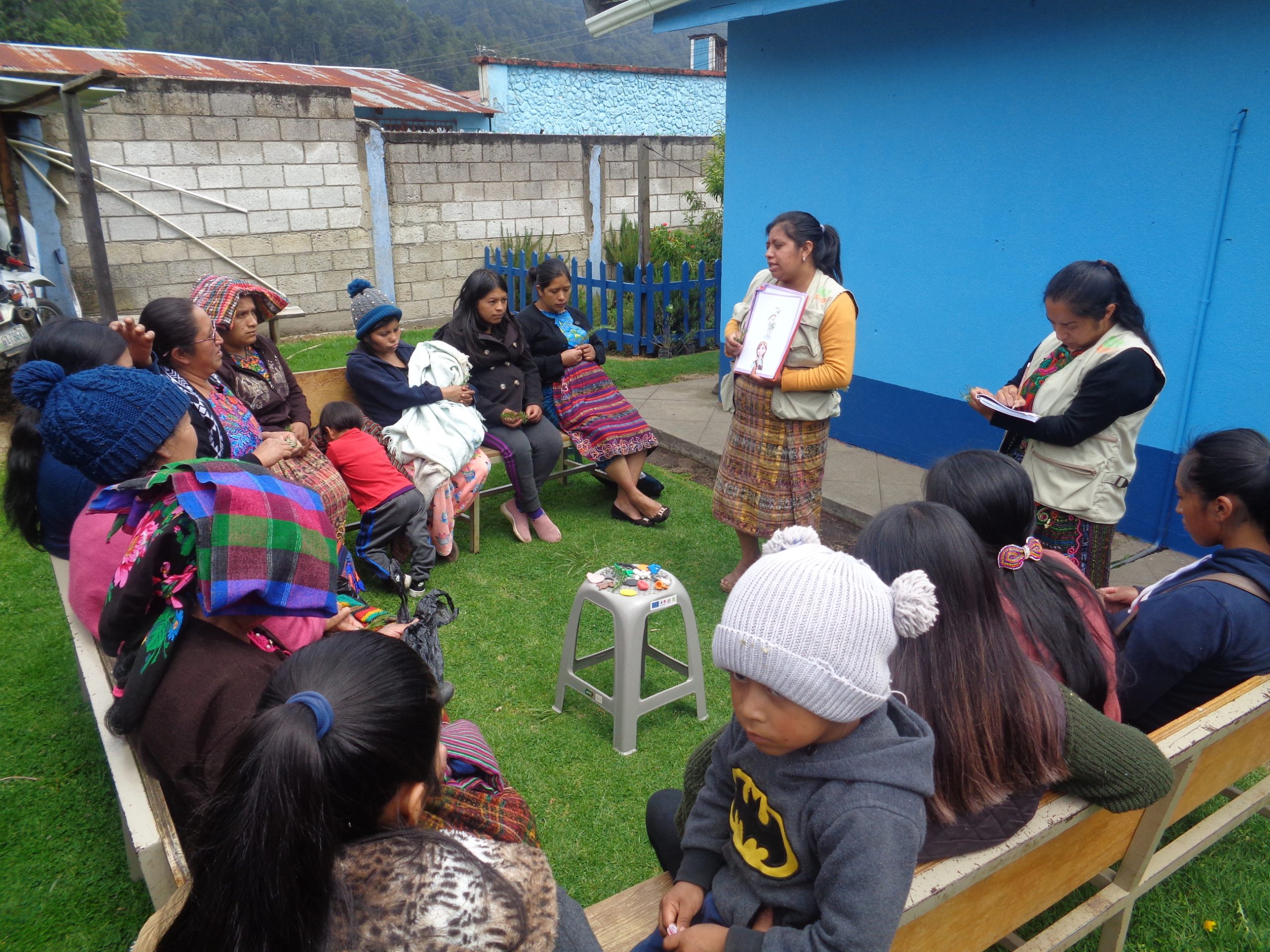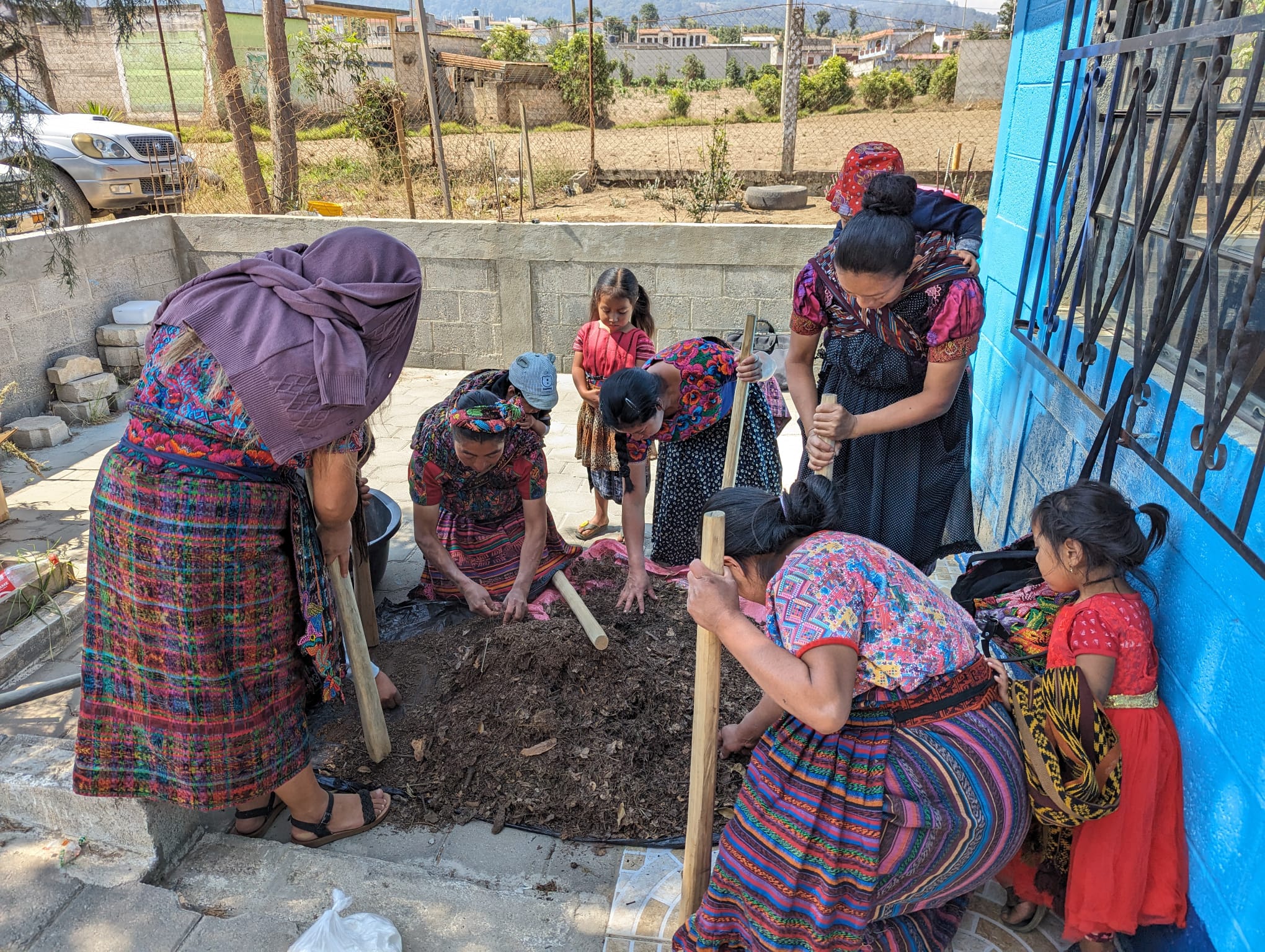
As our ‘Guatemala in Focus’ appeal continues to showcase our work with predominantly Indigenous Maya communities in the country, we look at how machismo impacts on women’s health and wellbeing.
What is machismo?
Machismo is the belief in male dominance and the subjugation of women, enforcing harmful gender norms and perpetuating gender inequality and violence. It takes many forms, and of course, although this is a global issue, each country, community, and family experiences a different face of machismo. It’s often culturally ingrained, impacting various aspects of life, including health.
Aracely Tzoc, a Maya K’iche’ woman who is our Community Facilitator in Guatemala, illustrates the pervasive nature of machismo in her community: “machismo is transcendental, passed on from generation to generation; a self-replicating system where fathers teach their sons.” She tells us that women have “lost their right to decide when they will get married”, often accepting proposals prematurely, because if they are not married by 20, they are seen as “past their date” or “not a good deal”.
The development of machismo in Indigenous Maya communities in Guatemala
While in reality there was no ‘golden period’ for gender equality in Maya history; a change in worldview resulting from colonisation, can be linked to machismo.
Tom Hart, Country Director in Guatemala, notes that traditionally, “in Indigenous Maya worldview, divinity is male and female … they are both of equal necessity and dignity … this has a big impact on your worldview”.
When the Spanish came to Central America, on a mission to convert people to Christianity, their success resulted in a significant change of worldview. Imposing a patriarchal view, and fundamentally altering perceptions of masculinity and femininity.
How does machismo affect the health of women in rural communities?
The People’s Charter for Health, endorsed by Health Poverty Action, states that “health is a social, economic, and political issue and above all a fundamental human right.” The systematic oppression of women in rural communities violates these rights, manifesting in several ways:

Pregnant women’s group in Guatemala
Control
In many households, “women often need their husband’s permission to go to meetings, such as Health Poverty Action’s meetings on nutrition or maternal health … sometimes, this permission is even needed to attend antenatal health checkups,” says Tom. Aracely adds, “husbands have been known to hide women’s ID cards so they can’t go to meetings or access services.”
This control extends to emergencies during labour. “If there is an emergency raised by the Traditional Birth Attendant, the woman herself is not usually in a position to decide, so this choice is put to the husband and mother-in-law, who might not want her to go to the hospital,” denying her critical care.
“Another issue is money and control. Usually, women don’t have cash of their own, which means they don’t have bus fare to go to a meeting or health post,” Aracely explains. These layers of control restrict women’s ability to make informed decisions about their health and healthcare.
Nutrition
Within the house, women also suffer due to machismo. Despite cooking the meals, and cleaning up afterwards, men of the household are often given a larger portion. Often, meals revolve around the husband’s preferences and needs, and his decisions about how much money can be spent on food for the house.
Education
Aracely tells us that many women who are in adulthood now were denied the opportunity of more than a year or two of primary education. This can make it harder to develop critical decision-making skills and independence.
Men’s education is seen as something with an opportunity at the end, to earn a high salary, whilst “girls have no such opportunity, they are born into the role of doing laundry, cooking, cleaning, and other household tasks”, Aracely explains. This disparity reinforces gender roles and limits women’s potential, keeping them in positions of economic and social dependency.
Abuse
Aracely tells us about the brutal reality of machismo directly harming women’s health; “the physical abuse usually starts after marriage, and husbands do this very strategically on their wife’s body so it will be invisible … Women understand that they have to put up with this”. “Sexual abuse is often common too, and normalised, a woman should have sex with their husband when he wants it”. “The abuse is also psychological, it is common for men to tell women that the know nothing, invalidate their opinion, tell them that they are worthless and useless, what they say is of no value”.
Another layer of complexity, is the economic and societal pressures women face when thinking about leaving an abusive partner; meaning that there often feels like no other option than to put up with the abuse.
Self-esteem
Linking to all the above issues, Tom tells us, “There are so many places where self-esteem is lowered, staring at home”. Women are seen as less valuable from their conception – Aracely says, “girls are seen as adding less value to the family”, and this is reflected in how a woman who is pregnant with a girl is attended to by her family. This societal devaluation deeply impacts women’s self-esteem, enforced further by the belief that equates personal grooming with sexual availability.
Lowered self-esteem is one of the most noticeable consequences of machismo in Indigenous Maya communities. Tom goes on to say “For example, in the pregnant women’s groups that we work with, it is very hard to get women to participate in discussions. They don’t think their opinions have value. This is part of the challenge of these groups, inducing participation”.
After moving in with their husband’s family, the subordinate position of the woman continues, and they are discouraged from asserting themselves. Aracely shares a conversation with a woman from Santa Lucia, where the mother-in-law would not give permission for her to go to a Health Poverty Action meeting because “they teach them ‘nonsense’ such as standing up for yourself, and other things which are not her ‘role’”.
This environment contributes to constant, self-doubt and guilt, particularly evident in cases of perinatal depression, where women face criticism and comparison rather than support from their families.
Eroding solidarity
“The way that machismo has affected solidarity between women is very pervasive, and quite scary, there is very little solidarity between women, and it has a huge impact on the way women experience life. Women are taught to attack each other over everything, they are in constant competition with each other. We see women are quick to judge women for doing certain things, quick to blame women for their own abuse, and feel as though if something is wrong in a household it is the woman’s fault”, Tom explains. This means that when women are facing the consequences of all the above issues, not only do they not have any support system, but they feel alone in their experience, often making it harder to overcome.

Practising relaxation techniques at a women’s group in San Francisco, Guatemala
How are things changing?
Despite these challenges, change is happening. Tom emphasises the role of media in shifting perspectives, with younger generations rejecting macho norms. Aracely tells us “They [young girls] want more independence, it is becoming less rare for girls to leave home, without marrying first, and get a job somewhere”.
Government policy – mi familia progresa (my family progresses)
Government policies, such as “Mi Familia Progresa,” have also contributed to a cultural change. Initiated between 2008 and 2012, this program aimed to improve education, health, and nutrition among vulnerable populations by providing benefits to families whose children attended school. Although direct benefits are now limited to free meals within school, expectations around girls’ attendance at school have improved. In addition to providing knowledge and opportunities, this education reinforces a child’s autonomy through teaching critical skills and confidence.
“The gap between boys and girls in school inscription has seen massive progress over the last decade, decade and a half”, Tom says. Aracely agrees: “The fact that boys and girls are receiving more education they are different when they leave school. Men who complete secondary school behave differently towards their wives.”
Health Poverty Action – women’s groups
Health Poverty Action supports women’s groups for pregnant women and new mothers, covering topics like health check-ups and nutrition. These sessions aim to foster solidarity and challenge harmful norms. Aracely notes, “the idea of ‘not washing your dirty laundry in public’ is common and challenging to overcome”.

Discussing depression with pregnant women and mothers Calel, Guatemala
Tom adds, “We try to create a safe space to discuss their issues through role play or other activities. We are making progress, slowly; it is a big change.”
Solidarity is growing as women help each other with small things like sharing bus fares to attend meetings or offering informal paid employment. They are also eager to teach each other skills like basket weaving or raising livestock to sell at the market.
In some sessions, when we have the resources, we provide tools for learning skills like crochet. Tom highlights three benefits of these sessions: “Firstly, there is improved self-esteem from learning new things. Secondly, there are economic benefits from selling handmade items, which also validates their attendance in their husbands’ eyes. And thirdly, we see more solidarity among women through shared learning experiences.”
£30 could help cover the costs of materials for teaching crochet in a women’s group.

Women learning to produce natural fertiliser at the health post vegetable and medicinal plant garden, Guatemala
Additionally, these educational groups, paired with the vegetable gardens we facilitate at health centres, which you can learn about here, give women a better sense of self-assuredness when it comes to making their own health and nutrition choices, potentially changing the decision-making dynamic in the family.
To conclude
In conclusion, the widespread influence of machismo in rural communities in Guatemala underscores the urgent need for sustained and collaborative efforts to redefine the perceived ‘role’ of women, providing them with opportunities to build solidarity and acquire essential skills that empower them to make informed decisions about their health. As we continue our ‘Guatemala in Focus’ appeal, it is crucial to recognise and challenge the entrenched attitudes that affect health. By working together with communities, we can create lasting benefits to overcome health inequalities.

